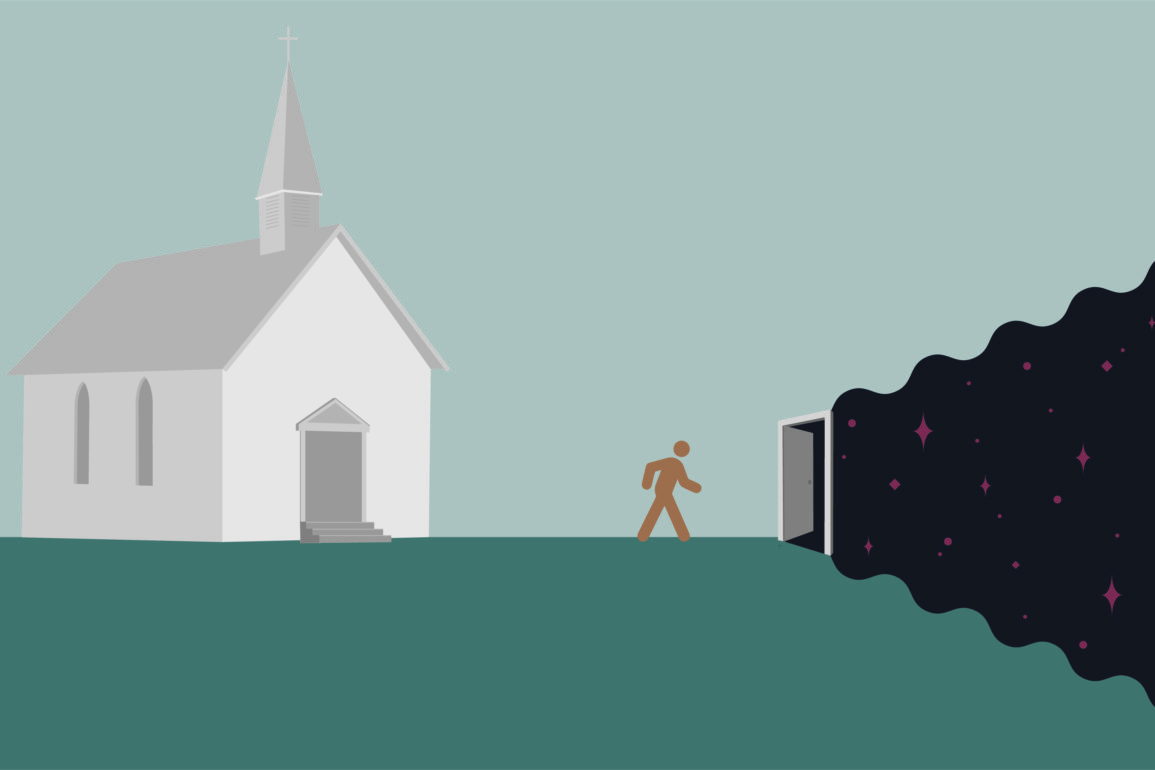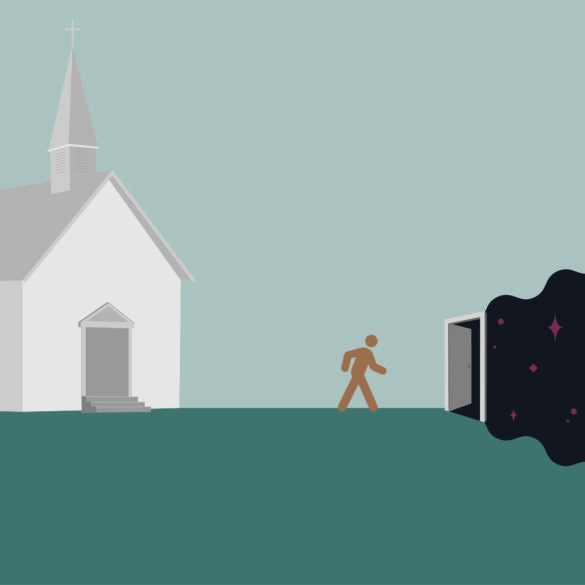The institution of religion needs people, but not all people need the institution.
My brother clears his throat of the incense.
Twelve altar servers. I counted 12 of them.
In a Catholic church service, or Mass, two—sometimes more, but usually two—robed adolescents will assist the priest, so 12 was extreme. According to the United States Conference of Catholic Bishops website, servers assist the priest celebrant and deacon as necessary during the Mass.
The church we were visiting had 12 of them. They didn’t look enthusiastic.
The priest performing was as boring as he was melodramatic.
Until that moment, I had never understood why everyone wasn’t Catholic. My church and my priest were progressive enough. He could get us in and out in less than 50 minutes. He always had great sermons, and he was grounded, with no flair for the dramatics.
But in that moment, with a Gregorian chant ringing in my ears, I knew that what was going on around me was a bit odd—the chanting, rites, rituals, and so many other things that were done because of tradition and because that’s the way it’s always been done. And if I thought it was a bit weird, then people who didn’t grow up in the Catholic Church would most definitely think it was weird.
It wouldn’t be so strange to leave the rite, ritual, and dogma in the Middle Ages. And it wouldn’t be so weird to want to distance yourself from an institution that has made its fair share of mistakes. A research study conducted by the City University of New York found that 4 percent of all American priests active between 1952 and 2002 had allegations of sexual abuse.
Maybe people don’t need all the rites, rituals, and dogma to be a good Catholic—or better yet, to be a good person.
It could be the desire to be able to say, “I’m spiritual, not religious.” To get away from an institution that sometimes corrupts the religion itself, or to strip away everything and focus on one’s self or something else entirely. Either way, people are leaving the church. The U.S. Religious Landscape Survey reported that the Catholic Church has lost more members over the past few decades than any other major religion.
Pew Research Center found that almost 60 percent of former, now unaffiliated Catholics say they left the church because of Catholic teachings on abortion and homosexuality. About half note issues about Catholic teachings on birth control.
When I was home during the second weekend of spring break, I went to Mass with my parents. I was chomping at the bit to see what kind of sermon the priest would deliver because his sermons were always insightful.
But he didn’t deliver a sermon.
Instead, he turned the floor over to the principal of the adjoining Catholic school so she could ask the congregation for money.
The church is a business, and sometimes that can be the biggest turnoff of all. I knew from my eight years enrolled that the school did a lot of good, but I didn’t need a sales pitch that Sunday. And I bet I wasn’t the only one who felt that way.
Rachel Kraus, a professor of sociology at Ball State University, says there are a multitude of reasons people might become fed up with the institution of religion. In today’s society, there is a premium placed on individuality and some—usually younger people—don’t want to be associated with any institution, but they’ll hold on to particular beliefs and practices.
Kraus says it is common to see slideshows and contemporary bands at church or temple because the institutions are trying to use technology to combat their dwindling numbers and attract more people.
It is important that you marry another Jew, a Sunday school teacher would inform a young Kraus.
What about love? Kraus would ask.
It is important that you marry another Jew.
The exchange with her Sunday school teacher illustrated the want to keep the institution alive. It was further exemplified by her father, who was a rabbi, telling her he’d sooner perform a marriage between a same-sex couple dedicated to Judaism than a heterosexual couple who was not.
In many religions, there are coming-of-age ceremonies meant to mark the youth as an adult member of the congregation. Kraus says these ceremonies are meant to hopefully cement the person as a member of the church or temple for life.
For that reason, when Kraus told her father she didn’t want a bat mitzvah, he was devastated.
She says people who have fallen away from their religion and return later in their lives typically do so when they are having kids. She said there is a rooted belief that children need a religious upbringing.
Today, Kraus is not religious. She doesn’t believe prayer has to look a certain way, and she says there is no right path of spirituality. She doesn’t believe in one right religion.
Because of this, she struggled with having faith.
Some people might only experience spirituality when they are isolated, and others might feel it when they’re at ceremonies, a part of a congregation, or other moments.
“At the same time that people want to be individuals, we also want to belong,” Kraus says.
Kraus explained that when someone is involved in a religion, they belong to a pre-made community. That pre-existing community affords people with ways to live, potential friends, a support system, and other, in theory, benefits.
“Both my husband and I, to be very, very frank, sometimes feel very isolated,” Kraus says. “We feel disconnected because neither one of us have any kind of pre-existing community.”
Even so, Kraus is an individual at heart and not always belonging works for her.
But it doesn’t work for me, and I figured that out after speaking with my mother. I realized I need that community. I need to belong. I need others keeping me accountable in my life of faith.
My mother said she’s known people who leave the church because they didn’t like the minister or the music played during services. She told me there’s no sense in getting caught up with things out of my control and that there is hypocrisy and bad things going on everywhere, in every religion. But there is good, too.
Catholic, Baptist, Lutheran, non-denominational, or something else—my mom doesn’t care. As long as I’m going to church.
There are problems with the Catholic Church. Business sometimes shifts to its main priority. Corruption can be common. Leaders can get caught up in tradition. But to me, there’s more good than bad. Others might not see it that way, and that’s fine.
You can be spiritual and not religious. You don’t need the institution of religion. You can be happy and unaffiliated. Kraus proves that.
But I will stay in the church. It offers me teachings that I know in my heart—for the most part—are good. It gives me a community of people that will always be willing to help me.
Spirituality is typically intensely personal, and religion can be the opposite. Religion can be when a group of people pitch in to keep a school running. During Mass on spring break, I wanted an awe-inspiring sermon to wake me up, but the sales pitch I got instead kept the lights on in a classroom full of kids being taught to be good people according to the morals of that faith. Religion is sacrifice and helping your neighbor. Religion is about being a part of a community that you aren’t the center of.
Religion connects me to the people I love: my immediate family and the classmates and friends I’ve grown up with in church.
If all the good of my church is overpowered by the bad, I’ll re-evaluate. But until that day, you can find me in church.




